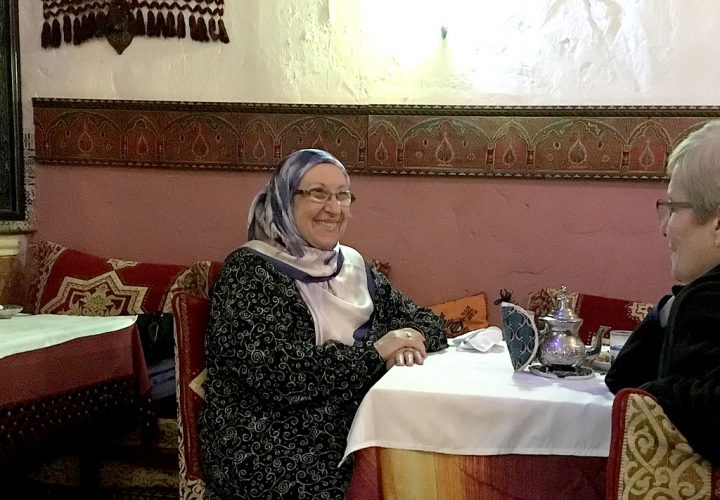Valencian by birth, Muslim, Honorary President of the Islamic Cultural Centre of Valencia, Honorary President of the Citizens’ Platform against Islamophobia and businesswoman behind the Balansiya restaurant.
We met Amparo for a delicious Andalusian meal at her restaurant Balansiya. We started the interview over dessert.
Among many other awards, last April 25 she was awarded the Guillem Agulló 2018 prize by the Valencian Parliament for her outstanding merits in defending people and groups discriminated against for religious reasons and against hate crimes. She has worked for decades to promote Valencian Islamic heritage, both tangible and intangible. Also, for the value of dialogue and the role of women in society.
Amparo, how are you experiencing the permanent discrimination of Muslims?
Generalizing is complicated, we live in very different ways. Some with a lot of tragedy, others experience everything, others take it with laughter, but as always the most affected are women. Women have a worse time than men: gender islamophobia. When there is islamophobia towards men, women are used as a weapon.
What is Gender Islamophobia?
It’s sad that a girl is still judged on whether she wears one set of clothes or another, and not judged on her intellectual capacity, her academic capacity, her professional preparation, that she is denied access to university or work because she has decided to wear a veil that covers her hair, I think it’s terrible. There are also some very confusing arguments that are very damaging, such as the supposed liberation of Muslim women: that they take off their headscarf to free themselves, but who told you that this woman needs to be liberated because she wears a headscarf? Does she take off her headscarf and is already liberated? It’s funny. If a woman needs to be liberated and wears the imposed headscarf, by force, I’ll be the first to support her taking it off, but if she wears it freely, of her own free will, she’ll have to be respected. We women have the right to freedom of choice, the right to our own image, the right to practice religion as we see fit. The headscarf is not a gender issue, it is a religious issue. They use religion to attack women and vice versa. The model they defend is national Catholicism, and that is where most of us are left out.
About feminism, how do you see it?
Diversity is enriching, there are many feminisms. It’s us and our circumstances. It is clear to me that I defend women’s rights and equality with men. In all cultures women are affected by patriarchy and that is the real struggle, not between us. Women must freely choose what they want to be. Authentic feminism must help women achieve their goals, not those dictated by a hegemonic feminism that does not represent all women, nor all feminisms. That misunderstood feminism says you have to achieve its goals, not yours. That way it’s subduing women. If you really care about women, you have to understand them, listen to them and help them to be what they want to be and achieve their own goals, even if they don’t coincide with yours.
The moment Islam appeared – in the year 622 – it began to defend women. Women were killed as soon as they were born, women were less than nothing. That is why from the beginning one of the first prohibitions was not to kill the girls. This was expressed in the sacred book, in the prophetic tradition and in the practice of the first caliphs. At that time, there were women ministers, wise women, teachers of teachers, to vindicate the role of women within religion. Today, Muslim scholars are working, promoting and defending all these concepts that are very important, so that we know what happened then and how we see in Islam the issue of women from the beginning.
How does terrorism affect the Muslim community?
It’s really hurting us, it’s tearing us apart. Unfortunately, terrorists are encouraged, their speech is taken for granted, it is spread and supported. People are beginning to see us as a danger, as a threat and it is very painful. That some shameless murderers have the audacity to say that they are doing what they are doing in the name of your religion, that kills you already. But also, that the rest of society points the finger at you, blames you and stigmatizes you hurts a lot. Terrorists kill many more Muslims in non-Western countries, but the media only get news when they kill Westerners, and that helps people point fingers at us and discriminate against us.
What does being a Muslim mean to you?
It’s a way of life that implies peace. Peace is the fundamental key. Peace with God, with his commands, peace with oneself and with others. Spiritual peace and social peace. The greeting ‘Salam alaykum’ is peace. The word Islam has a root that comes from the word Salam. Islam is peace, without peace Islam is nothing. A peace in the broadest sense, not only that there are no wars, that there is no violence, but a peace with creation. More and more young Muslims are linking Islam with ecology. We are all part of creation and we must respect and preserve that creation. In Arabic it is called a ´amána´, which means to leave something on loan to a person when I leave and they have the responsibility to take care of it and return it in the same state at least as when they received it. In other words, it is a loan with repayment for which you have to take responsibility. Children are an amana, life, health, nature, creation is all an amana. God has created all that so that we can all benefit. The Muslim is someone who benefits wherever they are… like the beneficial rain.










